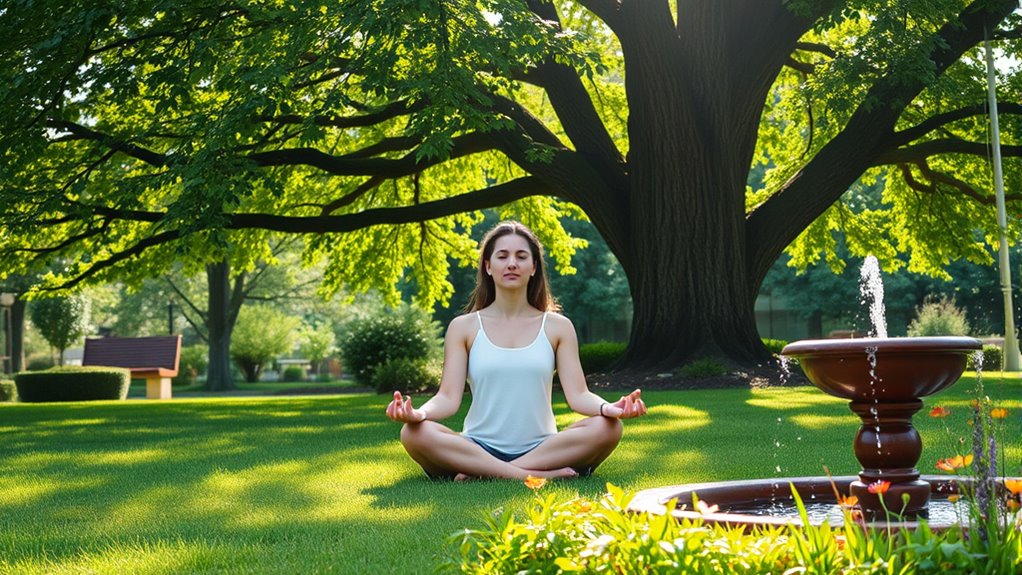To manage stress effectively, try mindfulness meditation and deep breathing exercises. Mindfulness helps you stay present and reduce anxiety by observing thoughts calmly, while deep breathing quickly relaxes your body and sharpens focus during stressful moments. Both techniques can be practiced anywhere and offer immediate relief. Regular use of these methods builds resilience and mental clarity over time. Keep exploring these approaches, and you’ll discover more ways to stay calm and centered even during tough times.
Key Takeaways
- Practice mindfulness meditation regularly to increase awareness and reduce stress triggers.
- Use deep breathing exercises to quickly activate relaxation during stressful moments.
- Incorporate a variety of stress reduction techniques for more effective management.
- Develop a consistent routine to build resilience and emotional regulation over time.
- Find quiet, comfortable spaces for mindfulness and breathing practices to enhance effectiveness.

Stress is an inevitable part of life, but how you manage it can make all the difference. One powerful technique you can try is mindfulness meditation. This practice encourages you to focus on the present moment, observing your thoughts and feelings without judgment. When you sit quietly and pay close attention to your breath, you create a mental space where stress has less power over you. Regular mindfulness meditation helps you become more aware of stress triggers and develop a calmer, more centered response. It’s simple to start—just find a quiet place, sit comfortably, and dedicate a few minutes each day to observing your thoughts and sensations. Over time, this can substantially reduce anxiety and improve your overall resilience to stress. Incorporating a variety of stress management techniques, such as relaxation exercises, can further enhance your ability to stay calm and balanced.
Alongside mindfulness meditation, deep breathing exercises are another effective way to manage immediate stress. When you’re feeling overwhelmed, your breathing often becomes shallow and rapid, which can intensify feelings of anxiety. By consciously slowing down your breath, you activate your body’s relaxation response. You might try inhaling deeply through your nose for a count of four, holding the breath for a count of four, then exhaling slowly through your mouth for another count of four. Repeat this cycle several times until you notice a sense of calm washing over you. Deep breathing exercises are accessible anytime and anywhere—whether you’re at work, stuck in traffic, or before bed. They help clear your mind, reduce physical tension, and bring your focus back to the present moment.
Frequently Asked Questions
How Long Does It Take to See Results From Stress Management Techniques?
You can start noticing the effects of stress management techniques within a few days to a couple of weeks, depending on your consistency. Timing expectations vary, but staying committed helps you see results faster. Some methods, like deep breathing or meditation, may show immediate calming effects, while others, like lifestyle changes, might take longer. Regular practice enhances effectiveness timelines, so keep at it to experience lasting stress relief.
Can Stress Management Techniques Be Personalized for Individual Needs?
Yes, stress management techniques can be personalized for your individual needs. You can tailor approaches like mindfulness, exercise, or deep breathing to fit your lifestyle and preferences. By experimenting with different methods, you discover what works best for you and adapt strategies accordingly. Personalizing your stress management plan makes it more effective, helping you reduce stress more efficiently and maintain a balanced, healthier life.
Are There Any Side Effects to Using Specific Stress Relief Methods?
Isn’t it true that even the gentlest stream can carve a canyon? Some stress relief methods may have possible side effects or method limitations you should consider. For example, meditation might cause dizziness, while certain breathing exercises could lead to hyperventilation. Always listen to your body, and consult a professional if you notice adverse reactions. Staying informed helps you choose techniques that truly support your well-being without unintended consequences.
How Do Lifestyle Changes Complement Stress Management Techniques?
Lifestyle changes, like maintaining a healthy diet and getting regular sleep, greatly enhance your stress management efforts. A nutritious diet fuels your body and stabilizes mood, while consistent sleep helps your mind recover and stay resilient. Together, these habits support your stress relief techniques by boosting your overall well-being, making it easier to stay calm and focused during challenging times. Implementing these changes creates a strong foundation for effective stress management.
Can These Techniques Help With Chronic Stress or Anxiety Disorders?
Yes, these techniques can help with chronic stress and anxiety disorders. Mindfulness practices help you stay present, reducing overwhelming feelings, while cognitive restructuring changes negative thought patterns that fuel anxiety. Regularly applying these methods can improve your emotional resilience, making it easier to manage persistent stress. Combining mindfulness and cognitive restructuring offers a powerful approach to alleviating chronic stress and supporting mental health over time.
Conclusion
Now that you know these effective stress management techniques, imagine how your life could change. With each method, you get closer to mastering your calm, your focus, your peace. But the real question is—are you ready to take the first step? Because once you do, you might uncover a strength you never knew you had. The key is in your hands—will you open it today, or wait for tomorrow? The choice is yours.









